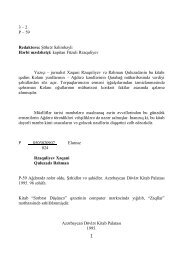ARMENIAN - Erevangala500
ARMENIAN - Erevangala500
ARMENIAN - Erevangala500
You also want an ePaper? Increase the reach of your titles
YUMPU automatically turns print PDFs into web optimized ePapers that Google loves.
Later, the leader o f the Turkish delegation brought up<br />
these incidents expressly at the Lausanne Peace Conference<br />
- and no one contradicted him. The surprise Greek<br />
attack against the Turks began on May 15, 1919 with the<br />
ambitious invasion o f western Anatolia. At last, the<br />
"Great Greek Empire" would rise again - after two thousand<br />
years! - on the soil o f Anatolia, which had long since<br />
become Turkish. The Allies had given their advance<br />
"blessing" to the adventurous Greek operation. That did<br />
not mean, however, that they would stand by the victims<br />
o f this megalomania when it foundered. This was soon<br />
made vividly clear by the fate o f the Greek and Annenian<br />
refugees.<br />
The Greek aggression was carried out using the most<br />
modern weapons and tremendous capital outlay, with the<br />
result being that the expeditionary forces soon reached<br />
Haymana - i.e., the city limits o f Ankara, the new capital.<br />
At this point, the aggression became life-threatening for<br />
Turkish Anatolia. The sound o f canon on the battlefield<br />
could be heard constantly in Ankara. The government did<br />
not consider surrendering, but rather moving - or fleeing<br />
- to Sivas. The Greeks had, however, overstretched their<br />
expansionist capacity. Starting from the gates o f Ankara,<br />
the Turks gradually won back territory. After eleven days<br />
o f fighting (from August 21 to September 2, 1921), they<br />
broke the spearhead o f the Greek attack outside Ankara.<br />
The defenders drove the aggressors back to the west.<br />
Old Smyrna - Izmir: A shelter for all religions, races: a perfect<br />
harbour for all.<br />
These were the happy and prosperous days o f Ottoman<br />
Smyrna, where Turks, Armenians, Jew s and inmummerabe foreign<br />
businessmen enjoyed a happy and rosperous life.<br />
During the turmoils o f spring 1915 nobody was deported<br />
from Smyrna, the Ottoman authorities believed in the loyalty o f<br />
their subjects, all together around 200 000 people, approximately<br />
h alf o f them o f Greek or Armenian origin.<br />
The Turks may have been barefoot and miserably<br />
equipped, but they were victorious nonetheless.<br />
France realized very quickly that the tide was turning and<br />
hurried to establish good relations with Ankara. Foreign<br />
120<br />
May 15 1919: The Greeks invade Anatolia. On this day the first<br />
troops with excellent equipment landed in Smyrna/Izmir in<br />
order to conquer the western part o f Anatolia, as far as Ankara,<br />
to make their dream namend "megali idea" - the idea o f a great<br />
Greek kingdon - true.<br />
May 1920 they occupied Bursa, July 1920 Edime.<br />
Indeed, with all their help from Britain and France, they<br />
reached the outskirts o f Ankara but were defeated finally by<br />
Ismet Inonu and his brave soldiers.<br />
Septemer 9, 1922, the Turkish forces re-conquered Izmir. Just<br />
one day before the Armenians set fire. The Turks should not<br />
enter a still blossom ing ancient town and perfect modem har<br />
bour, but ashes. (W hen the Germans retreated from Russian<br />
soil 1944/45 they also left behind "verbrannte Erde"...<br />
scorched earth). This is the simple truth, an answer to the old<br />
question: С U I BONO?<br />
Whose benefit? (Cicero/ Lucius Cassius).

















